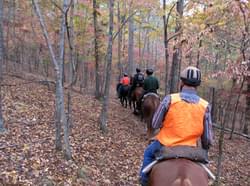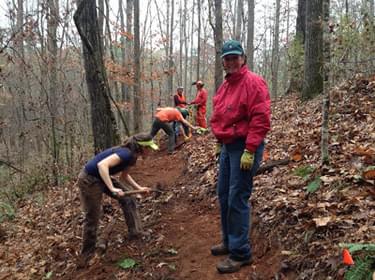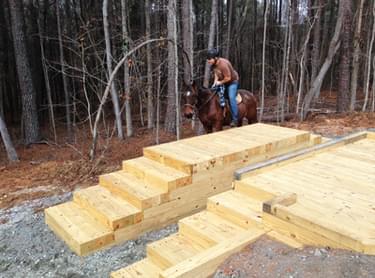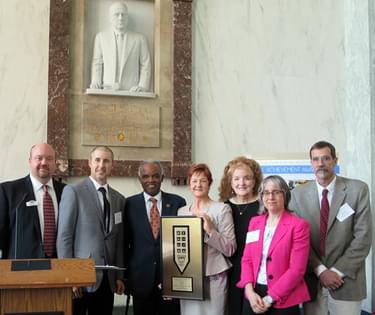
Maintenance and Rehabilitation
Cochran Mill Park Trail - Georgia

Equestrians ride the Cochran Mill Park Trail
Project funded construction of a 2.5 mile interpretive trail, trail-building machinery, maps and markers, information kiosk, and an equestrian mounting block to improve accessibility.
Located in Chattahoochee Hills Georgia, just 20 miles southwest of the Atlanta Airport, Cochran Mill Park, with 800 acres of woods, fields, and streams, features stunning waterfalls, huge boulders, rock outcrops, wildflowers, native azaleas, mountain laurel, and the ruins of three historic mills. In 2010, donations from almost 400 local families in the City of Chattahoochee Hills allowed the City to purchase Cochran Mill Park from Fulton County.
In 2013, a $100,000 Recreational Trails Program Grant from the Georgia Department of Natural Resources provided the funds to create a remarkable park transformation. Eight miles of new sustainable multi-use trails have been designed and constructed and ten miles of old trails have been rehabilitated.
Other park improvements include a 2.5 mile Interpretive Trail, additional parking, an information kiosk, and a trail entrance arch. An accessible equestrian mounting block is easily accessible from the new parking areas. Trail maps have been developed, with trail markers installed throughout the length of the park.
Most of the work to upgrade the park has been done by community volunteers who have donated more than 2000 hours and earned over $28,000 in matching funds. With the additional match from private donations and in-kind work, the total project cost was $137,000. Thanks to the RTP Grant and the work of many volunteers, Cochran Mill Park now has 18 miles of sustainable multiple-use trails shared by hikers, horseback riders, mountain bikers, and trail runners.
Maintenance and rehabilitation
Most of the original trails in the park, created many years ago by horseback riders without any plan or design, were steep, eroded, rocky, and dangerous. Volunteers trained in trail design, construction, maintenance, and crew leadership, assessed trails to identify areas in need of improvements. If erosion was present, a clinometer was used to determine if the trail exceeded the maximum sustainable grade, and if so, an environmentally sustainable alternative route was planned with rolling contour design and full bench construction.
Once a reroute was constructed, the old trail was reclaimed by scarifying the soil, replanting native plants taken from the new trail, and placing branches, leaves, and pine straw to hide the old trail. Vegetation was cleared from trails to make a corridor 6 feet wide and 10 feet high. Through maintenance and rehabilitation 10 miles of old trails are now are safer, more environmentally sustainable, and more accessible.
Construction and design
In December of 2012, twenty three Chattahoochee Hills volunteers learned Sustainable Trail Design and Construction at a two day workshop taught by the Georgia Recreational Trails Program Educational Specialist. The City was able to purchase a mini excavator and mini skid steer using RTP grant funds, and GIS software on a topological map were used for design.
New trails were constructed using the following process. First, using the GPS to transfer the map design to the land and a clinometer to measure grade, volunteers marked the new trails with surveyors tape and pin flags. Next, a leaf blower was used to clear the tread of the flagged trail. Then, the area was cleared of fallen trees, rocks and other debris using chainsaws and the mini excavator.
The trail tread bench was constructed using the mini skid steer fitted with a bucket with teeth. In-slope, out-slope, and grade reversals were constructed using the mini excavator with a 6-way blade and hand tools. Finally, volunteers removed broken roots using loppers, removed the flags, and installed trail markers. Virtually all of the trail design and construction was done by volunteers.
Designed and constructed according to the latest research on sustainability, our new trail system protects the environment, meets the needs of its multiple diverse users, requires little maintenance, and minimizes conflict between different user groups.
Public-private partnerships
Private partners and their contributions include:
- Southern Off-Road Bicycle Association (SORBA-Atlanta) - Trail work;
- Equestrian Association of Chattahoochee Hill Country (EACHC) - Trail work;
- Chattahoochee Hill Country Conservancy - environmental conservation;
- Serenbe Institute - Creative design;
- Cochran Mill Nature Center - Meeting facility;
- Community Brickworks, LLC - Communication and trail resource materials;
- Chattahoochee Hills Historical Society - Interpretive Trail; and
- Chattahoochee Hills Creek Keepers - Stream bank restoration.
Public partners include:
- City of Chattahoochee Hills - Trail construction equipment purchase and maintenance, trailhead parking lot construction, trailhead entrance arch construction, and ADA equestrian mounting block construction;
- C.H. Parks Commission - Volunteer coordination and support;
- C.H. Fire Department -Trail design for Emergency Search and Rescue; and
- C.H. Police Department - Trailhead design for park security.
This RTP grant project also served as a catalyst for ongoing collaboration and volunteers have committed to continue to work on the trails. A Memorandum of Understanding (MOU) between the City and SORBA-Atlanta provides structure for this ongoing work. The many public-private partnerships of the RTP Grant project have greatly increased access to and use of Cochran Mill Park. With the increased revenue from parking fees all to be used for the park, Chattahoochee Hills will be able to continue to improve Cochran Mill Park.
More winners of this award
2023: Royal Palm Beach Pines Trails System
2021: Statewide Fourteeners Maintenance
2021: Neahkahnie Mountain to Manzanita Trail
2020: Cal-Ida connector Trail
2019: Stage Coach Trail Improvements - Vermont
2018: Horseshoe Bend Park Trail Restoration - New Jersey
2017: Alaka'i Swamp Trail - Hawaii
2015: Ice Age Trail - Wisconsin
2014: Anthracite Outdoor Adventure Area - Pennsylvania
2014: Sawyer Trail Project/Russell Sage Wildlife Management Area - Louisiana
2013: Northern Erie Sno-Seekers Trail Grooming - New York
2012: Lombard Trail - Idaho
2011: Musselshell Trail System - Idaho
2010: Rampart Range OHV Development (Phase Three) - Colorado
2009: Kings Campground and Trailhead Project - California
2008: Storms' Crossing - Lewis and Clark Bicentennial Trail - South Dakota
2007: Cary Bayou Trail - Texas
2006: Wyoming State Trail Crew
2005: Kerby Peak Trail - Oregon
2004: Teton Wilderness Maintenance and Rehabilitation Projects - Wyoming



